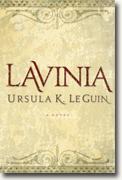Lavinia
Ursula K. Le Guin
book reviews:
· general fiction
· chick lit/romance
· sci-fi/fantasy
· graphic novels
· nonfiction
· audio books
· author interviews
· children's books @
curledupkids.com
· DVD reviews @
curledupdvd.com
newsletter
win books
buy online
links
home
for authors
& publishers
for reviewers

 |
Lavinia Ursula K. Le Guin Harcourt Hardcover 288 pages April 2008 |
|
Reinventing Virgil’s legendary Aeneid, Ursula Le Guin has fashioned an epic tale of war and redemption that revolves around the power of fate and the high cost of honor. At the beginning of this story, Lavinia leads a charmed and mercurial existence, keeping up the storerooms of the King's house while she frolics in the meadows of Latium with her best friend, Silvia. A fully independent spirit but also a royal princess, Lavinia is well aware that she’s also a marriageable virgin, obedient and ready to be molded to a man’s will.
Wild in manner and always imperious, Amata sees a match for Lavinia in her nephew, the splendidly handsome, blue-eyed Rutulian King Turnus, well-made and muscular, a young man with “hot blood running through his veins.“ Already wooed and won by his tales of exploits, triumphs and skirmishes, Amata fanatically pressures for a marriage while Lavinia becomes a shrinking and silent maiden: “my realm was virginity and I was at home in it.” To accept another suitor would be to bring civil war to the Kingdom, but deep within the glades of Albunea, an enchanted forest where dreams, ghosts, owls, oracles and ancestors come up from the dark underworld to make pools on the earth, a wraith appears in the form of a dying man yet unborn who knows about Lavinia’s past and offers advice on her future. As this oracle burrows deep into Lavinia’s soul, he tells her of the prophecy that a man is coming, a child of a goddess and a true hero whose name is Aeneas. No ordinary man, Aeneas led his people for seven years across the land and sea. Now he is bringing his gods with him, and guided by omens and oracles, he is destined to conquer and rule and to found a glorious everlasting empire in what will become Italy. In this sacred world of gods and goddesses, of portents and great powers, Lavinia faces her most difficult choice: Being loyal to her true love, the hero or the poet, her husband, the beautiful man whose “flesh her flesh encloses,” or listening to the other: a whisper in the shadows, a virgin’s dream or vision, and another prophecy that the earth itself will be burned by "black oily clouds" and that her beloved Aeneas will die after three years. Together in the house of Regia, the great shrine of the city, and in the high and strong walls of Laurentium, where the peace her father brought to Latium was thought to be so real and durable, Lavinia and Aeneus eventually come together, caught up in the Machiavellian schemes of Amata and Turnus. Supported by the emotionally fragile Amata, Turnus has his own ambitions to rule, but only with the beautiful Lavinia at his side. When Latinus has no choice but to break the truce with Turnus, Lavinia knows that she must follow her fate as the poet has told it. When bees writhe in a cloud of smoke, humming and droning, and Lavinia’s hair suddenly catches fire, scattering sparks and smoke all over the Regia; when Aeneas’ shield appears before her family with its mysterious foreshadowing of mighty buildings and endless wars, the fates of this novel eventually spin out their measured thread of what is to be. The final epic battle between Aeneas and Turnus is drenched in the blood and sweat of Etruscans, Greeks and Trojans, armies of men with swords rising and falling, the horrible noise of soldiers screaming as Aeneas and Turnus try to match their strength in a final, devastating clash of wills. In the end, the fury of bloodlust is overcome in the skirmish, turning the reluctant Aeneas into a mindless and indiscriminate slaughterer. Painting her scenes in hellish and heroic grandeur complete with battlement sieges, slaughter and rape, slave-taking, towns burning, and men who rant and boast and then kill more men, Le Guinn shows it all through the perspective of the single-minded and perceptive Lavinia, a woman who must follow her fate, just as the poet foretold. Spinning her tale from a uniquely feminist perspective, the author remains steadfast in her depiction of Lavinia as a woman loyal both to her father and to her lover right up until the very end. Eventually, it is her plight and her love for Aeneas - even after the fates have played their hand - that ultimately deliver some powerful messages about the nature of honor and heroism, and about the price of war and glory. Originally published on Curled Up With A Good Book at www.curledup.com. © Michael Leonard, 2008 |
|
|
|
 Click here to learn more about this month's sponsor! |
|
| fiction · sf/f · comic books · nonfiction · audio newsletter · free book contest · buy books online review index · links · · authors & publishers reviewers |
|
| site by ELBO Computing Resources, Inc. | |
 While Latinus, Lavinia’s aging father, is devoted to
this daughter who provides him gentle solace, her mother, Amata, harbors bitter resentment toward her daughter after illness
since claimed the lives of Lavinia’s two infant brothers. Burying herself deep in the crimp of loathing and desolate, scornful fury, the hot-tempered Amata
takes out her pain on Lavinia.
While Latinus, Lavinia’s aging father, is devoted to
this daughter who provides him gentle solace, her mother, Amata, harbors bitter resentment toward her daughter after illness
since claimed the lives of Lavinia’s two infant brothers. Burying herself deep in the crimp of loathing and desolate, scornful fury, the hot-tempered Amata
takes out her pain on Lavinia.